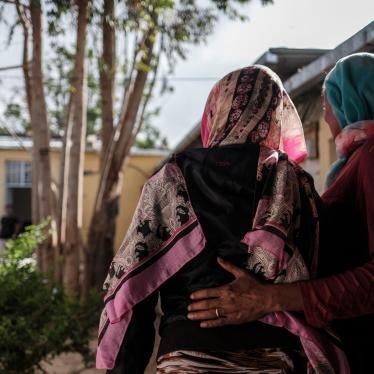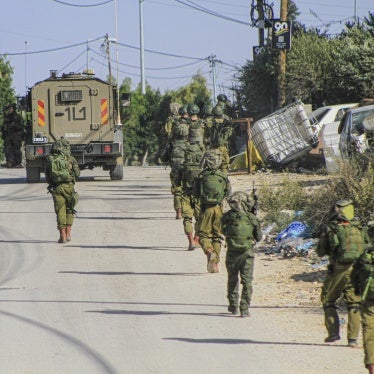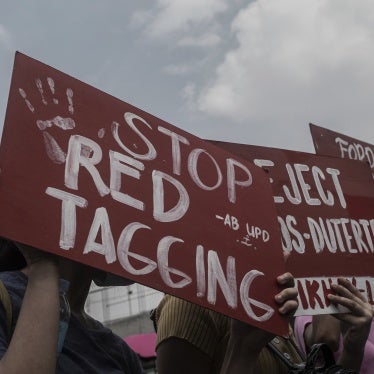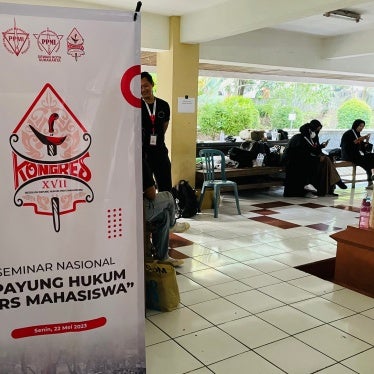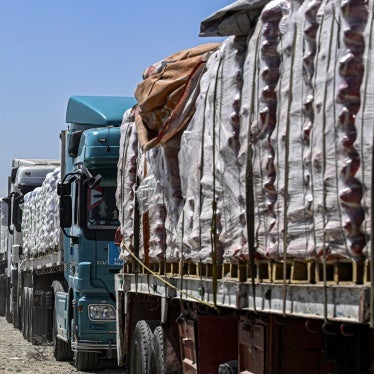In a letter to the government of Sudan, Human Rights Watch/Africa asks Sudan to refrain from carrying out the death penalty reportedly imposed on four women convicted of prostitution, and to compensate thirty-seven women peace demonstrators who were beaten, arrested, flogged and fined.
December 8, 1997
His Excellency Mahdi Ibrahim Mohamed
Ambassador of the Republic of Sudan to the U.S.
2210 Massachusetts Ave., N.W.
Washington, D.C. 20008
fax 202-667-2406
RE: Women in Sudan on Human Rights Day
Your Excellency:
It is with deep concern that Human Rights Watch has received reports of the imminent execution on December 10, 1997 internationally celebrated as Human Rights Day of four women convicted of prostitution in Khartoum. We urge your government to refrain from executing these women because doing so would violate international and U.N. human rights standards. Under these circumstances, imposing the death penalty on four women on international Human Rights Day would make a mockery of human rights.
We also protest the detention, beating and flogging of another group of women who were demonstrating in Khartoum, in the exercise of their right of free expression. This penalty was carried out at 1:00 a.m. on December 2, 1997, within twenty-four hours of their arrests. We urge you to compensate the arrested women, to repeal the penalty of flogging, and to assure that future peaceful protests proceed undisturbed.
The abolition of the death penalty is desirable and strongly suggested in article 6 (right to life) of the International Covenant on Civil and Political Rights (ICCPR), according to the U.N. Human Rights Committee (General Comment 6, Article 6 (Sixteenth session, 1982), Compilation of General Comments and General Recommendations Adopted by Human Rights Treaty Bodies, U.N. Doc. HRI\GEN\1\Rev.1 at 6 (1994)). In countries which have not abolished the death penalty, the sentence of death may be imposed only for the most serious crimes in accordance with the law in force at the time of the commission of the crime, under Section 6 (2) of the ICCPR.
What such serious crimes are is further defined in section 1 of the U.N. Safeguards Guaranteeing Protection of the Rights of Those Facing the Death Penalty (E.S.C. res. 1984/50, annex, 1984 U.N. ESCOR Supp. (No. 1) at 33, U.N. Doc. E/1984/84 (1984)):
In countries which have not abolished the death penalty, capital punishment may be imposed only for the most serious crimes, it being understood that their scope should not go beyond intentional crimes with lethal or other extremely grave consequences.
In section 154 of the 1991 Criminal Act, prostitution is a crime, but purchasing the services of a prostitute is not. Therefore it strains logic to conclude that the drafters of the 1991 Criminal Act considered prostitution to have the very serious "lethal or other extremely grave consequences" required to impose the death penalty.
Imposing the death penalty for prostitution, a crime for which the death penalty was not prescribed by law at the time of its commission, is a violation of the U.N. Safeguards, section 2. A press account states that the four were found guilty under the 1983 Criminal Act. It is our understanding that the 1983 Act had been superseded by the 1991 Criminal Act. In section 154 of the 1991 Act, prostitution is not a crime punishable by death. The death penalty (or life imprisonment) is provided only in section 155, for the related crime of "running a place for prostitution," and then only after three convictions of the crime of running a house of prostitution.
We are also concerned that the convicted women may not have enjoyed the necessary safeguards in the course of their trial and sentencing. Section 4 of the U.N. safeguards states, "Capital punishment may be imposed only when the guilt of the person charged is based upon clear and convincing evidence leaving no room for an alternative explanation of the facts." We also are concerned that the four women may not have had adequate legal assistance at all stages of the proceedings, as required under section 5 of the U.N. safeguards.
The haste of the appeal a mere fifteen days according to the press account violates the intent and letter of sections 6 and 7 of the U.N. safeguards, which provide for a right to appeal and a right to seek pardon or commutation of sentence. Fifteen days is not sufficient time, even in a country with an efficient communications infrastructure, to make the appeal or seek pardon. And Sudan does not now have efficient communications: many government officials working in the justice system have emphasized to us the difficulty of routine tasks such as making copies of files, on account of lack of resources and other reasons.
We are shocked that the death penalty is even contemplated in the case of the four women convicted of prostitution. In our meetings with government officials, we were assured that the death penalty, although on the books, is sparingly applied in Sudan, that the Sudanese culture does not tolerate the kind of excessive use of the death penalty as seen in other countries. We also note that the other cases of imposition of the death penalty seem to have been for intentional, lethal crimes, such as the killings of worshipers at the Ansar al Sunna mosque in 1994.
Human Rights Watch opposes all executions under law because of the inherent cruelty of the death penalty, the inherent fallibility of all criminal justice systems, and the irreversibility of executions. Even if we did not oppose the death penalty, the imposition of the death penalty as contemplated in the case of these four prostitutes would be a grave miscarriage of justice.
The factual information about the death penalty cases was contained in the report of a journalist based in Khartoum whose work has been accurate in the past, quoting the government news service and interviews with several government officials. [Nhial Bohl, "Prostitutes Sentenced to Death," IPS, Khartoum, November 25, 1997.]
The case of the women peace demonstrators is troubling as well. According to usually reliable sources, the women were detained on December 1, 1997, after presenting a petition to U.N. representatives in Khartoum. This same petition, in opposition to military conscription of boys between sixteen and eighteen years, had already been presented to the Parliament, where the matter had already been raised by at least one member of Parliament. The entire group of about fifty women demonstrators were said to be carrying two banners, "Yes for Democracy," and "Stop the Forced Conscription of Students." They were peacefully demonstrating in front of the UNDP headquarters when the security forces arrived. According to a report of the U.N., "the women, including the elderly, were brutally assaulted with sticks and rubber hoses and slapped on their faces by police and security officers. The women were arrested and dragged into police vehicles. The assault of the women was witnessed by a large number of UN staff members who had gathered at the gate" of the U.N. compound. One, Samera Talib Ismael, is said to have suffered a broken arm and another, Sarah Hamd Elneil is said to be suffering from internal bleeding and in critical condition and is still hospitalized. Some of the injured were taken to a hospital where they were roughly bandaged, but then promptly sent to join the rest of the group for trial.
We were informed that several lawyers attempted to represent the women, but they were not permitted to have individual counsel. One advocate, Mustapha Abdel Gadir, protested to the judge because of the medical condition of the most seriously injured young woman. This led to the women being sent back to the hospital and the advocate being fined 500,000 Sudanese pounds (about $300 US).
In all thirty-seven women were said to have been arrested, the oldest being sixty-seven years old. Among them were lawyers, university lecturers, medical personnel, political activists, and others. We understand that they were tried by Judge Mohamed Sir El Khatim Gharabawi in a public order court, and convicted. Of these, all were fined and the younger women (reports disagree on the number, which ranges from twelve to twenty-six women) were sentenced to lashing as well. The penalties were carried out on the spot, and these women received ten lashes each, with the exception of Lelyan Mohamed Salih Hussein, who was wearing trousers and consequently received an additional thirty lashes. At 1:00 a.m. the lashings were complete and the fines paid, and all were released, but an advocate Mustafa Abdel Gadir, was forced to spend the night in jail, being regarded as in contempt of court.
This punishment of the exercise of the right of free expression violates human rights on several counts. First, there should be no abridgement of free expression, and demonstrating by walking on the streets together, carrying banners and presenting a petition to authorities are forms of expression. The women protested compulsory military service for boys between sixteen and eighteen: according to one press account, a government spokesman noted that none of them had a relative who was a conscript. This is irrelevant. They are entitled to have an opinion on the draft and the war whether or not they are directly affected. No one demands that those attending rallies to support the government and the war have a relative in the armed forces or militia. The pro-government demonstrators number in the thousands. Why cannot the government tolerate a small opposition demonstration by one hundred women?
The beatings administered by the police and security forces at the time of arrest violate international police norms. The medical assistance rendered those injured by the police and security forces appears to have been inadequate, especially in view of the account of the sickness of one woman in the courtroom.
Flogging is a violation of article 7 of the International Covenant on Civil and Political Rights: "No one shall be subjected to torture or to cruel, inhuman or degrading treatment or punishment...." Flogging is a punishment usually associated with slavery. Flogging is for this reason and others degrading treatment, regardless of who is flogged.
We were even more disturbed to learn of reports that the flogging was administered by women prisoners in jail for other crimes. This violates the rights of those other women prisoners, as set forth in U.N. guidelines: "No prisoner shall be employed, in the service of the institution, in any disciplinary capacity." (Section 28 (1), Standard Minimum Rules for the Treatment of Prisoners, adopted Aug. 30, 1955 by the First United Nations Congress on the Prevention of Crime and the Treatment of Offenders, U.N. Doc. A/CONF/611, annex I, E.S.C. res. 663C, 24 U.N. ESCOR Supp. (No. 1) at 11, U.N. Doc. E/3048 (1957), amended E.S.C. res. 2076, 62 U.N. ESCOR Supp. (No. 1) at 35, U.N. Doc. E/5988 (1977).
Finally, we condemn the continued mistreatment of the advocate Mustafa Abdel Gadir. He has been subjected to numerous arrests and beatings, all related to the practice of his profession and his attempts to represent clients that the government dislikes.
In conclusion, we urge you to refrain from executing the four women reportedly sentenced to death for prostitution and to abolish the death penalty. We also urge you to compensate the women who have been beaten and flogged, and punish those responsible. We further urge you to permit all further peaceful protests to proceed without fear of arrest or ill-treatment, and to remove cruel, inhuman and degrading penalties from the penal code. These measures are necess ary to demonstrate respect for human right s.
Sincerely,
Peter Takirambudde
Director, Africa Division
Jemera Rone
Counsel
Human Rights Watch Human Rights Watch
cc: His Excellency Lt. Gen. Omar Hassan al Bashir
President of the Republic of Sudan
Khartoum, Sudan
fax 249-11-771-724
Brig. Bakri Hassan Sali h
Minister of Int erior
Khartoum, Sudan
fax 249-11-781-824/776-554
Mr. Abdel Basset Sabdrat
Minister of Justice and Attorney General
Khartoum, Sudan
fax 249-11-774-063
Mr. Ali Osman Mohamad Taha
Minister of Foreign Affairs
Khartoum, Sudan
fax 249-11-774-063
Chief Justice Obeid Haj Ali
Supreme Court
Khartoum, Sudan
fax 249-11-774-063
Dr. Ahmed El Mufti
Advisory Council on Human Rights
Khartoum, Sudan
fax 249-11-779-173
His Excellency Fatih Erwa
Permanent Representative of the Republic of Sudan to the United Nations
New York, New York
fax 212-573-6160

